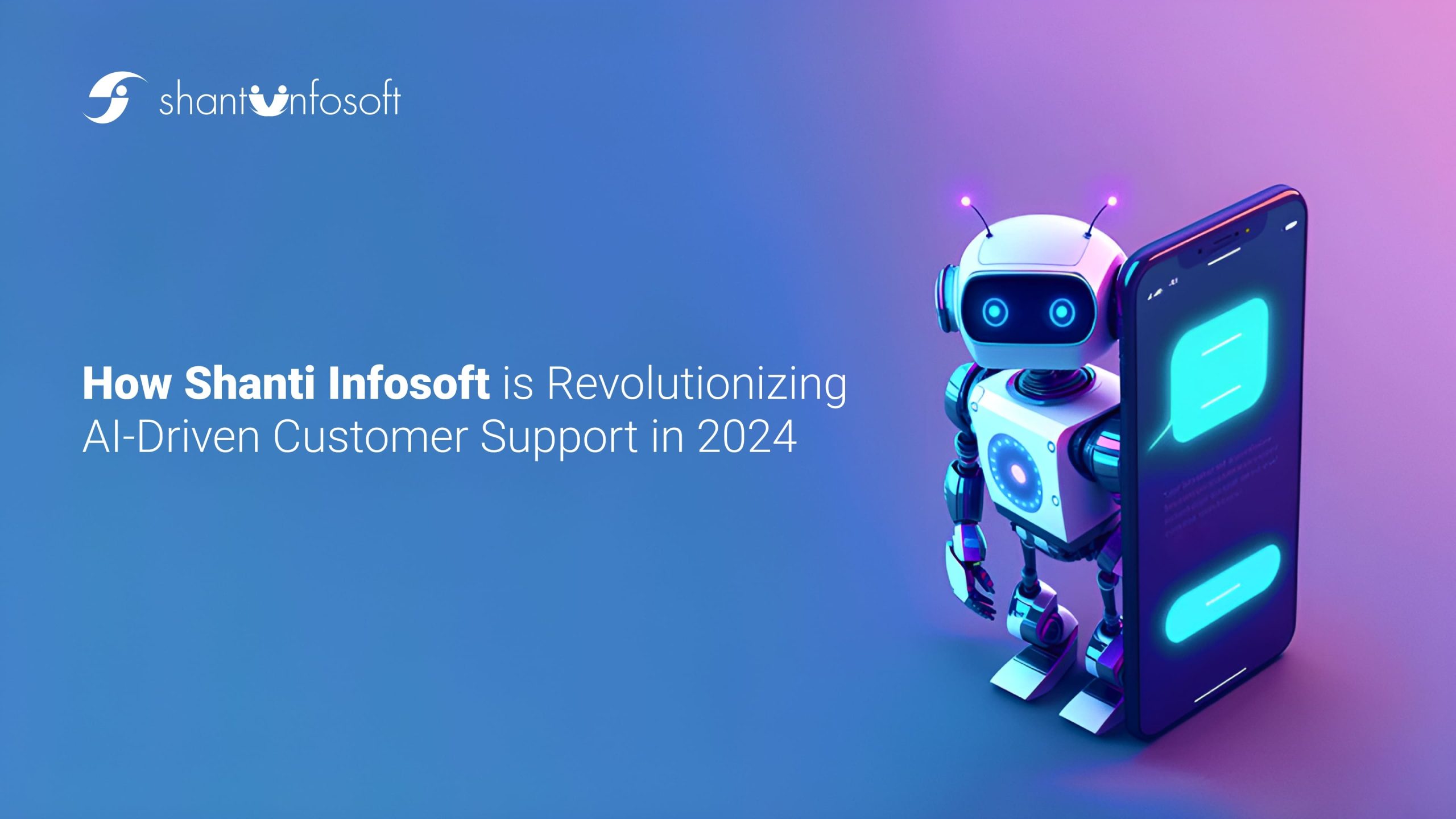Responsible AI: 6 Steps Businesses Should Take Now By Shanti Infosoft
Technology
Problem:
Artificial Intelligence (AI) is transforming industries, boosting operations, enhancing efficiency, and opening new revenue streams. However, with this immense potential comes the growing concern of responsibility. Businesses must ensure their AI systems are not only compliant with regulations but also align with responsible AI practices to build long-term trust with customers.
A 2023 McKinsey report found that 56% of companies implementing AI encountered ethical concerns such as biased decision-making and privacy violations. These issues don’t just harm a company’s reputation—they affect profitability. Gartner predicts that by 2025, businesses adopting responsible AI practices will see a 30% rise in customer satisfaction. Companies must now ask, “How do we harness the power of AI while avoiding the pitfalls of unethical practices?”
Agitation:
The absence of a robust Responsible AI framework puts businesses at significant risk. Customer trust can erode, regulatory fines may loom, and AI projects meant to deliver a competitive advantage could falter. Imagine launching an AI-driven solution, only to face public backlash because the model unintentionally introduces bias. Worse yet, sensitive customer data could be compromised due to insufficient privacy protections.
The key question isn’t whether your business should use AI—it’s how to use it ethically and responsibly. The stakes are high, and failing to implement Responsible AI could damage customer relationships and diminish the very competitive advantage that AI promises.
What should businesses do now? Let’s explore six practical steps to help you harness AI’s potential while mitigating risks.

Solution:
Step 1: Develop Ethical AI Guidelines
The foundation of Responsible AI starts with clear ethical guidelines. Every website design company and app development company should create an AI code of ethics that defines acceptable AI use, potential risks, and how these risks will be mitigated.
Case Study:
A leading financial services firm, AXA, adopted AI to streamline their insurance claims processing. However, they quickly identified the risk of bias in claims from minority groups. To mitigate this, AXA established an internal AI ethics board to monitor model fairness, ensuring their AI didn’t favor specific demographic groups. As a result, AXA enhanced its transparency and trust with customers.
By setting up a dedicated ethics board or committee to oversee AI development, businesses can ensure that their AI models align with principles like fairness, transparency, and accountability, preventing ethical issues before they arise.
Step 2: Prioritize Data Privacy and Security
AI systems rely heavily on data, making privacy and security essential. Protecting sensitive customer information during collection, analysis, and storage is non-negotiable for businesses.
Fact:
A 2021 study by IBM found that data breaches cost businesses an average of $4.24 million per incident—a 10% increase from the previous year. Responsible AI requires stringent privacy measures such as encryption, data anonymization, and compliance with international regulations like GDPR.
Whether you run a website design company or an app development company, your AI models should be designed to minimize the collection of personally identifiable information (PII) and ensure top-notch security protocols are in place.
Step 3: Address AI Bias
AI models are as unbiased as the data they are trained on. If your data is skewed, the AI will perpetuate and even exacerbate those biases, leading to unfair outcomes.
Example:
In 2019, Amazon discovered that its AI-based recruitment tool was biased against women. The AI had been trained on past resumes, predominantly from male candidates, resulting in discriminatory hiring decisions. Amazon eventually scrapped the tool after discovering this bias.
To prevent such issues, businesses must regularly audit their datasets and ensure diverse representation. Microsoft and Google, for example, have developed fairness tools designed to identify and remove biases from their AI models. These steps are especially vital for app development companies and website design companies that interact directly with user data.
Step 4: Emphasize Transparency and Explain ability
Many AI models operate like “black boxes,” where the logic behind decisions remains hidden. Responsible AI requires that these decisions be explainable and transparent, especially when they affect customers.
Fact:
According to a PwC report, 80% of consumers expect transparency in how AI systems work, particularly in industries such as healthcare, finance, and e-commerce.
For both app development companies and website design companies, adopting explainable AI (XAI) practices can enhance customer trust. XAI techniques allow businesses to interpret AI-driven decisions and provide clear, understandable explanations to stakeholders, fostering transparency and mitigating risks of misunderstanding.
Step 5: Implement Continuous Monitoring and Updates
AI models are not a “set it and forget it” tool. As data changes, AI systems need to evolve and adapt. Continuous monitoring ensures that AI remains effective and unbiased over time.
Case Study:
Tesla’s autonomous driving system exemplifies this well. By collecting and analyzing millions of miles of driving data, Tesla is continuously improving its AI algorithms, enhancing safety and performance.
Businesses should create feedback loops that monitor AI performance and regularly review model outcomes. This is critical for app development companies deploying AI-based solutions, as these systems need regular updates to ensure they remain secure and accurate over time. Regular performance reviews, model updates, and ethical audits will ensure responsible, long-term AI use.
Step 6: Invest in AI Education and Training
As AI reshapes business models, employees and stakeholders must be equipped with the knowledge and skills to navigate these changes responsibly. Investing in AI training programs is essential for ensuring responsible use.
Fact:
Deloitte found in a 2022 study that businesses investing in AI education for employees experienced a 15% increase in AI project success rates. For a website design company or app development company, educating employees on the ethical and technical aspects of AI is critical for aligning with Responsible AI principles.
Training programs should go beyond technical skills and include ethical frameworks, regulatory considerations, and a deeper understanding of how to mitigate risks. Building a responsible AI culture within the organization is essential for sustainable success.
Conclusion:
The benefits of AI are undeniable, but so are the risks if not deployed responsibly. By taking these six steps—developing ethical guidelines, prioritizing data privacy, mitigating bias, ensuring transparency, implementing continuous monitoring, and investing in education—businesses can harness AI's full potential while upholding ethical standards.
At Shanti Infosoft, we believe in the power of Responsible AI. Whether you're a website design company looking to optimize customer interactions or an app development company aiming to deliver AI-powered solutions, our team can help you implement ethical, secure, and trustworthy AI systems.
Take the next step in your AI journey with Shanti Infosoft—where innovation meets responsibility. Contact us today to learn how we can transform your business with cutting-edge, responsible AI solutions.







 Food & Beverage
Food & Beverage
 Sports
Sports
 News
News
 Manufacturing
Manufacturing
 Insurance
Insurance
 Healthcare
Healthcare
 Real Estate
Real Estate
 E-Commerce
E-Commerce
 Luxury
Luxury
 Fashion & Retail
Fashion & Retail
 Education
Education
 Tourism
Tourism
 Automobile
Automobile
 Media & Entertainment
Media & Entertainment












































